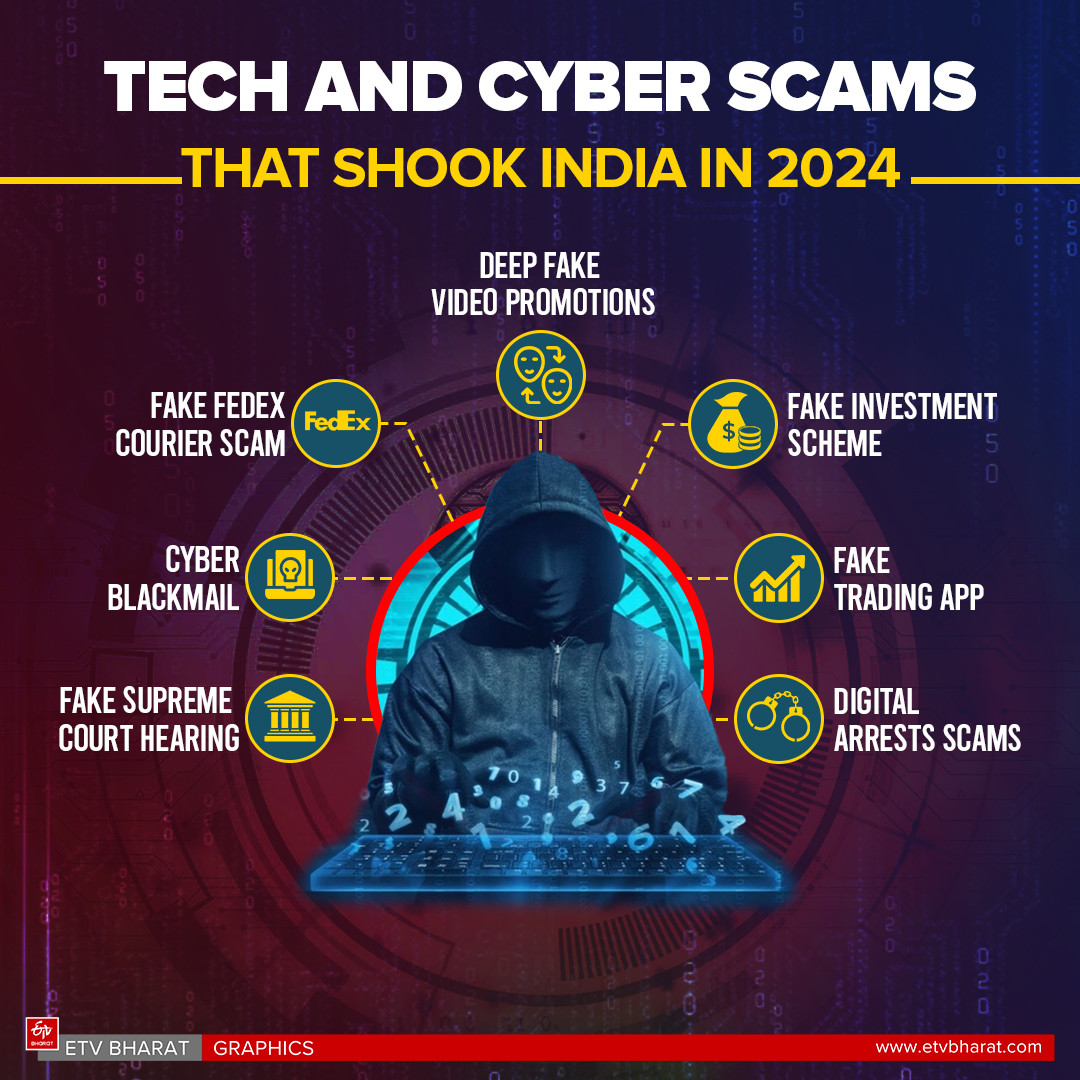Yearender 2024: The year 2024 saw a surge in tech scams that impacted India, revealing the evolving and malicious nature of cybercrime. From deep-fake videos exploiting the likeness of beloved cricket icons to sophisticated ransomware attacks targeting major brands, the landscape of digital fraud reached alarming new heights. This year has also exposed the vulnerabilities of everyday citizens and high-profile individuals alike, with cybercriminals employing increasingly deceptive tactics. From January 1 to November 11, India registered over 14 lakh cybercrime cases.
Whether it's the digital impersonation of trusted couriers, the relentless cyber blackmail of the elderly, or the elaborate scams leading to catastrophic financial losses, these incidents underscore the urgent need for heightened digital vigilance and proactive measures. Here's a detailed look at some of the most headline-grabbing tech scams that unfolded in India in 2024.
[Note: These scams have affected numerous people, and the individual cases mentioned here serve to illustrate the way these scams operate.]
Deep Fake Video Promotions
In January 2024, cricket legend Sachin Tendulkar became a victim of deepfake technology when a manipulated video surfaced online, showing him promoting a game called Skyward Aviator Quest. The video falsely depicted Tendulkar endorsing the game and even claimed that his daughter was benefiting from it. Tendulkar quickly denounced the video as fake and called on social media platforms to take swift action against such misinformation. This incident highlights the growing concern over the misuse of deepfake technology and the potential harm it can cause to individuals and their reputations.
Fake FedEx Courier Scam
In February 2024, the CEO of a Bengaluru IT firm received a call from an individual posing as a FedEx executive from Mumbai, claiming that an illegal parcel in his name had been intercepted. The caller then transferred the call to someone impersonating a police officer, who alleged a case had been filed against the CEO. Over the next week, the CEO was coerced into transferring Rs 2.3 crore in eight transactions to various accounts, believing he was resolving the fabricated issues. Once the CEO realised the scam, he reported the incident to the police on February 16. This scam underscores the sophisticated methods used by cybercriminals and the necessity of being cautious with unsolicited communications.
Fake Investment Scheme
In July 2024, a 75-year-old retired senior manager from a public sector unit in Telangana fell victim to the state's largest cyber fraud. The scam began with an investment proposal sent via WhatsApp, promising impressive returns. Within ten days, the victim had invested Rs 4 crore. When his account showed a supposed balance of Rs 10 crore, he attempted to withdraw the funds. However, he was then asked to pay various taxes, including GST, CGST, conversion tax, and foreign exchange tax, ultimately transferring an additional Rs 9 crore over the following 15 days. After nearly 50 days, the victim realised he had been defrauded. Out of the total Rs 13 crore lost, the police were able to recover only Rs 20 lakh. This incident highlights the sophisticated tactics used by scammers to lure victims with promises of high returns and the devastating financial impact of such cyber frauds.
Cyber Blackmail
In August 2024, a 74-year-old man from Pune endured a traumatic five-day ordeal of cyber blackmail. Fraudsters posing as police officers coerced him into staying on prolonged phone calls and making multiple visits to the bank to transfer a total of Rs 97 lakh. The scammers threatened him with arrest for alleged crimes such as sending obscene messages, money laundering, and matters of national security. This case highlights the extreme psychological and financial pressure victims of cyber blackmail face, as well as the sophisticated tactics used by cybercriminals to exploit their targets.

Fake Trading App
In August 2024, a 75-year-old retired ship captain from Mumbai was duped out of Rs 11.16 crore in the second-largest cyber fraud of the year. The scam started when he was added to a WhatsApp group, where he was offered investment advice and enticed to invest through a fake trading app. Over the next month, he made 22 transactions to various accounts as directed by the scammers. When he attempted to withdraw his profits, he was repeatedly asked to pay additional fees, and his requests were denied. Realising he had been scammed, he reported the incident to the cyber police, who launched an investigation.
Fake Supreme Court Hearing
In August 2024, S P Oswal, the chairperson of the Vardhman Group and a Padma Bhushan awardee, was defrauded of Rs 7 crore in a sophisticated cyber fraud scheme. Fraudsters posing as federal investigators contacted Oswal, claiming he was a suspect in a money laundering case. They organised a fake online court hearing where someone impersonated India's Chief Justice D Y Chandrachud and ordered Oswal to deposit his funds into an account as part of the investigation. Oswal, fearing legal repercussions, complied and transferred the money. The scam was uncovered when Oswal reported the incident to the authorities, leading to the arrest of the suspects and the recovery of Rs 5.2 crore.
Digital Arrests Scams
In one of the biggest cyber crimes reported in Bengaluru, a 39-year-old software engineer lost Rs 11.8 crore to fraudsters within 18 days of "digital arrest". According to police, the victim's ordeal began on November 11 with a call from a person claiming to be an officer from the Telecom Regulatory Authority of India (TRAI). The caller alleged that a SIM card linked to the victim's Aadhaar was being used for illegal advertisements and harassment messages, with a case supposedly registered at Mumbai's Colaba Cyber Police Station.
Shortly afterwards, another individual, posing as a police officer, contacted the victim and claimed that his Aadhaar was being misused to open bank accounts for money laundering. The caller warned the victim to keep the matter confidential, citing the involvement of influential individuals already under arrest for similar offences and threatened physical arrest if the victim failed to cooperate with their so-called "virtual investigation".
On November 25, a scammer pretending to be a senior police officer reached out to the victim over Skype, claiming the case was being heard in the Supreme Court. Fearing arrest, the victim transferred Rs 75 lakh to one account, followed by Rs 3.41 crore to another. By December 12, he had sent a total of Rs 11.8 crore to various accounts controlled by the fraudsters.
Tips to Stay Safe from Tech Scams
By staying vigilant and informed, you can better protect yourself and your loved ones from falling victim to these malicious schemes. Staying informed about common scams can help you recognise and avoid them. To safeguard your personal information, regularly update your passwords, use two-factor authentication where possible, and keep your device software updated to protect against malware and ransomware attacks.
Following are some tips that can be adopted to lessen one's chances of being a victim of such tech and cyber frauds:
Verify Before Trusting: Always verify the identity of the person contacting you, especially if they claim to be from a well-known organisation. Avoid sharing personal information or making transactions based on unsolicited calls or messages. The same goes for courier-related scams and fake legal proceedings. Contact the service, organisation, or authority directly using official contact details to verify the claims.
Beware of Deepfake Technology: Be cautious of videos and audio clips that seem too good to be true, especially if they involve famous personalities endorsing products or services. Verify through official channels before believing or sharing such content.
Stay Alert to Investment Schemes: Be sceptical of investment opportunities that promise unusually high returns. Conduct thorough research and consult trusted financial advisors before making any investment.
Protect Yourself from Cyber Blackmail: Avoid engaging with suspicious calls or messages that threaten legal action or demand money. Report such incidents to the authorities immediately.
Scrutinize Trading Apps: Only use reputable trading apps and platforms that are well-reviewed and recognised by financial authorities. Be wary of unsolicited invitations to join trading groups or apps.



